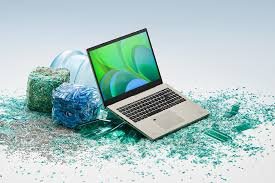Sustainability is no longer just a buzzword — it’s a way of life. With growing awareness of environmental issues, consumers are increasingly seeking out eco-friendly products, including laptops. Electronics have long been a significant source of e-waste, but with advancements in technology, there are now laptops designed with sustainability in mind. These eco-friendly laptops prioritize recyclable materials, energy efficiency, and ethical manufacturing, making them a crucial part of living sustainably.
In this guide, we’ll explore what makes a laptop eco-friendly, the brands leading the way, and how you can make a greener choice without sacrificing performance.
Introduction to Sustainable Technology
Technology has become an integral part of modern life, but it comes at a cost. The electronics industry is responsible for a massive amount of environmental damage, from mining raw materials to the mountains of e-waste left behind when devices become obsolete. Eco-friendly technology aims to change that by reducing the negative impact of electronics on the planet.
For laptops, this means using recyclable materials, energy-efficient designs, and sustainable manufacturing practices that prioritize the environment. As the demand for eco-friendly products grows, more companies are stepping up to create laptops that meet both the needs of consumers and the planet.
What Makes a Laptop Eco-Friendly?
Not all laptops are created equal when it comes to sustainability. So, what exactly qualifies a laptop as eco-friendly? It’s a combination of several key factors:
Use of Recyclable Materials
The most visible aspect of an eco-friendly laptop is its material composition. Laptops made from recycled aluminum, plastics, or even bio-based polymers reduce the need for virgin materials, helping to conserve resources and minimize pollution.
Energy Efficiency and Low Power Consumption
Eco-friendly laptops are designed to consume less energy, which not only saves you money on electricity but also reduces the device’s overall carbon footprint. Features like energy-efficient processors, LED backlighting, and power-saving modes all contribute to a greener product.
Responsible Manufacturing Processes
Manufacturers that prioritize sustainability often focus on reducing emissions, using renewable energy in their production facilities, and cutting down on water consumption. Companies that engage in responsible sourcing for raw materials, ensuring ethical labor practices, are key players in the eco-friendly tech movement.
The Importance of Recyclable Materials in Electronics
Recyclable materials play a crucial role in making laptops more eco-friendly. Here’s why they’re so important:
Reducing E-Waste
The electronics industry generates millions of tons of e-waste annually. By designing laptops with recyclable components, manufacturers can drastically cut down on this waste and ensure that parts are reused instead of ending up in landfills.
Extending the Product Life Cycle
Laptops made from recyclable materials tend to have longer life cycles. Even after they are no longer useful in their current form, many of their parts can be repurposed, recycled, or used in new products, reducing the overall demand for raw materials.
Benefits for the Environment
Using recycled materials reduces the need for mining and processing raw materials, which can be extremely harmful to the environment. It also lowers the carbon emissions associated with the production process, making the entire lifecycle of the laptop much more sustainable.
Key Materials Used in Eco-Friendly Laptops
Several materials are commonly used in the production of eco-friendly laptops. These include:
Recycled Aluminum and Steel
Many laptops now feature bodies made from recycled aluminum or steel. These materials are durable, lightweight, and can be recycled multiple times without degrading in quality.
Recycled Plastics and Bio-based Polymers
Plastic waste is a huge issue globally. Some laptops use recycled plastic or bio-based polymers, which are biodegradable and break down more easily than traditional plastics.
Rare Earth Metals and Their Recycling Challenges
Rare earth metals are critical for the performance of electronics, but they are difficult to recycle and often come from conflict regions. New methods are being developed to improve the recycling rates of these essential materials, further enhancing the sustainability of laptops.
Leading Brands Offering Eco-Friendly Laptops
Several leading tech companies have embraced sustainability and are offering eco-friendly laptops:
Dell’s Commitment to Sustainability
Dell has been at the forefront of sustainable design, using recycled plastics and packaging made from renewable materials. The company also offers recycling programs for old devices.
Apple’s Use of 100% Recycled Aluminum
Apple is known for its sleek designs, but it’s also a leader in sustainability. Many of its newer models are built using 100% recycled aluminum, and Apple has committed to becoming carbon neutral by 2030.
HP and Its Focus on Circular Economy
HP is dedicated to reducing e-waste through its circular economy initiative. The company uses recycled materials in its products and has take-back programs that allow consumers to recycle old devices.
Acer’s Vero Series
Acer’s Vero series is specifically designed with eco-conscious consumers in mind. These laptops use post-consumer recycled plastics and are highly energy efficient.
Features of a Sustainable Laptop
When shopping for an eco-friendly laptop, look for these key certifications and features:
Energy Star Certification
Laptops with an Energy Star certification meet strict energy efficiency guidelines set by the EPA. This means they use less energy to perform the same tasks as non-certified devices.
TCO Certified
TCO Certified laptops are designed with environmental and social responsibility in mind. They are made from more sustainable materials and are built to last longer.
EPEAT Rating
The Electronic Product Environmental Assessment Tool (EPEAT) is a global certification that rates laptops based on their environmental impact. The higher the EPEAT rating, the more eco-friendly the device.
Benefits of Using Eco-Friendly Laptops
Why should you consider switching to an eco-friendly laptop? Here are some of the benefits:
Lower Carbon Footprint
Eco-friendly laptops are designed to use fewer resources, consume less energy, and produce less waste. All of
these factors contribute to a lower carbon footprint.
Healthier Work Environment
Laptops made from non-toxic, sustainable materials can contribute to a healthier indoor environment, especially when paired with energy-efficient accessories.
Contribution to Circular Economy
By purchasing eco-friendly laptops, you support a circular economy where products are reused and recycled, rather than discarded.
How to Properly Recycle Your Old Laptop
Got an old laptop? Here’s how to ensure it’s disposed of sustainably:
Take-Back Programs
Many laptop manufacturers offer take-back programs where they’ll recycle your old device for free.
Certified E-Waste Recycling Centers
You can also take your laptop to a certified e-waste recycling center, where they’ll ensure it’s recycled according to environmental standards.
DIY Recycling Tips
If you’re a DIY enthusiast, you can disassemble the laptop and recycle its individual parts, such as the battery, hard drive, and plastics.
Challenges in Creating 100% Eco-Friendly Laptops
Though great strides have been made in sustainable technology, there are still some challenges:
Limited Availability of Recycled Materials
While the use of recycled materials is growing, there’s still a limited supply, which can drive up costs and limit the availability of eco-friendly laptops.
High Manufacturing Costs
Producing eco-friendly laptops often costs more due to the sustainable materials and processes involved. This can make them more expensive for consumers.
Balancing Performance and Sustainability
Manufacturers must strike a balance between creating a high-performance laptop and one that’s eco-friendly. Some materials that are better for the environment might not offer the same performance benefits.
Innovations Driving Sustainable Laptops Forward
Exciting innovations are making laptops even more eco-friendly:
Modular Designs for Easy Repairs
Modular laptops, like those from Framework, are designed to be easily repairable and upgradable, reducing the need for frequent replacements.
Biodegradable Materials in Development
Researchers are exploring the use of biodegradable materials for electronics, which could make laptops more environmentally friendly once they’ve reached the end of their life cycle.
Future of Fully Renewable Energy-Powered Devices
Some companies are working on laptops that run entirely on renewable energy, further reducing their environmental impact.
How to Choose the Best Eco-Friendly Laptop
When shopping for an eco-friendly laptop, here’s what to consider:
Consider Longevity and Upgradability
Look for laptops that are designed to last and can be easily upgraded, reducing the need to buy a new one every few years.
Look for Sustainable Packaging
Many eco-friendly laptops come in packaging made from recycled or biodegradable materials, which is another way to reduce your environmental impact.
Evaluate the Brand’s Commitment to Sustainability
Research the brand’s environmental policies. Do they offer take-back programs? Are they transparent about their sourcing and manufacturing practices?
How to Maintain an Eco-Friendly Lifestyle with Your Laptop
Owning an eco-friendly laptop is just the first step. Here’s how to maximize its impact:
Optimize Energy Settings
Adjust your laptop’s energy settings to reduce power consumption. Use sleep mode, dim the screen, and unplug the charger when not in use.
Use Eco-Friendly Accessories
Opt for accessories made from recycled materials, like laptop cases, mouse pads, and chargers.
Regular Maintenance to Prolong Lifespan
Keep your laptop in good condition by cleaning it regularly, avoiding overheating, and updating its software. This helps extend its life and reduces the need for replacements.
Conclusion
Switching to an eco-friendly laptop is a small change that can make a big difference in your environmental footprint. These laptops not only use recycled materials and energy-efficient components, but they also encourage responsible consumption through modular designs and take-back programs. As more companies prioritize sustainability, eco-friendly laptops are becoming a mainstream option without sacrificing performance.
By making thoughtful choices, such as opting for a laptop with recyclable materials and following sustainable practices, you can be a part of the solution for a greener future.
FAQs
- What are the best eco-friendly laptops available today?
Brands like Dell, Apple, HP, and Acer offer some of the best eco-friendly laptops on the market, with recycled materials and energy-efficient designs. - How do I know if my laptop is made from recyclable materials?
Look for certifications like Energy Star, TCO Certified, and EPEAT ratings, or check the manufacturer’s sustainability policies. - Can eco-friendly laptops compete with high-performance traditional laptops?
Yes, many eco-friendly laptops offer excellent performance while using sustainable materials. Brands like Apple and Dell are known for balancing performance with sustainability. - What should I do with my old laptop to ensure it’s recycled properly?
Use take-back programs or certified e-waste recycling centers to dispose of your old laptop responsibly. - Are modular laptops better for the environment?
Modular laptops are a great choice for sustainability as they can be easily repaired or upgraded, reducing the need for frequent replacements.





Leave a Reply